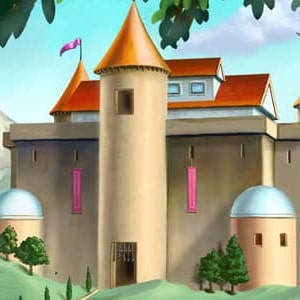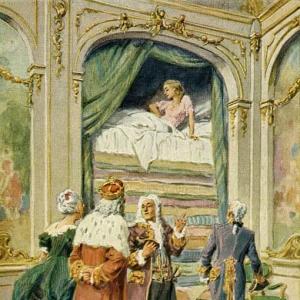Reading time: 3 min
A certain King had three sons who were all equally dear to him, and he did not know which of them to appoint as his successor after his own death. When the time came when he was about to die, he summoned them to his bedside and said, „Dear children, I have been thinking of something which I will declare unto you; whichsoever of you is the laziest shall have the kingdom.“ The eldest said, „Then, father, the kingdom is mine, for I am so idle that if I lie down to rest, and a drop falls in my eye, I will not open it that I may sleep.“ The second said; „Father, the kingdom belongs to me, for I am so idle that when I am sitting by the fire warming myself, I would rather let my heel be burnt off than draw back my leg.“ The third said, „Father, the kingdom is mine, for I am so idle that if I were going to be hanged, and had the rope already round my neck, and any one put a sharp knife into my hand with which I might cut the rope, I would rather let myself be hanged than raise my hand to the rope.“ When the father heard that, he said, „Thou hast carried it the farthest, and shalt be King.“
 Learn languages. Double-tap on a word.Learn languages in context with Childstories.org and Deepl.com.
Learn languages. Double-tap on a word.Learn languages in context with Childstories.org and Deepl.com.Backgrounds
Interpretations
Adaptions
Summary
Linguistics
„The Three Sluggards“ is a lesser-known fairy tale from the collection of German folktales compiled by the Brothers Grimm, Jacob and Wilhelm Grimm. The brothers, who were both academics and linguists, collected and published these tales during the early 19th century, with their first volume, „Children’s and Household Tales“ („Kinder- und Hausmärchen“), released in 1812. The collection eventually grew to include over 200 stories, and the Grimm Brothers‘ work became one of the most influential contributions to the genre of fairy tales.
The Brothers Grimm collected their stories from various sources, including oral traditions, manuscripts, and printed books. Their primary aim was to preserve the German cultural heritage and folklore, which they believed was in danger of being lost. The tales they compiled often featured themes like morality, cautionary lessons, and magical elements. The Grimm Brothers‘ collection includes some of the most well-known fairy tales, such as „Cinderella,“ „Snow White,“ „Rapunzel,“ and „Hansel and Gretel.“
„The Three Sluggards,“ like many other fairy tales in the Grimm Brothers‘ collection, reflects the values and beliefs of the time and place in which it was collected. The story may have served as a form of entertainment or a source of moral instruction. Its focus on laziness and the potential consequences of such a trait can be seen as a reflection of the societal values that emphasized hard work and diligence.
„The Three Sluggards“ can be interpreted in various ways, offering different lessons and insights:
Satirical commentary on leadership: The story may be a satirical commentary on the idea of leadership and the qualities deemed necessary for rulers. The King’s decision to reward laziness could be seen as a critique of leaders who inherit their positions without having to work for them or demonstrate any real skills.
A test of honesty: The King’s challenge to his sons can also be interpreted as a test of honesty. By asking them to admit their most significant flaws, he is assessing their ability to be truthful, even when it might not be in their best interest. In this sense, the third son’s extreme laziness might be secondary to his honesty, making him a more suitable ruler than his siblings.
The importance of self-awareness: Another interpretation highlights the importance of self-awareness. The sons openly acknowledge their weaknesses, which may suggest that recognizing and accepting one’s limitations is a valuable trait. By admitting their flaws, the sons display a level of self-awareness that could be beneficial in a ruler.
Irony and humor: The story can be read as a humorous and ironic tale, poking fun at the idea of laziness as a desirable trait. The sons‘ increasingly outlandish claims of laziness may be intended to entertain and amuse readers, rather than provide any profound lesson or moral.
A cautionary tale: Lastly, the story can be seen as a cautionary tale about the dangers of laziness. By choosing the laziest son as the new King, the father may have unwittingly set the kingdom on a path to decline and misfortune, illustrating the potential consequences of valuing idleness over hard work and dedication.
„The Three Sluggards“ has inspired several adaptations in various forms of media. Here are a few examples.
Film Adaptations: The story has been adapted into several films, including „The Three Lazy Ones“ (1927), „The Three Sluggards“ (1930), and „Three Lazy Sons“ (1949). These films often adapt the story to different settings and time periods, but they retain the basic plot and characters.
Literary Adaptations: The story has also been adapted into numerous children’s books, often with illustrations to accompany the text. One example is „The Three Sluggards“ by Eliza Lee Follen, which was published in 1856.
Musical Adaptations: In 1938, the composer Paul Hindemith wrote an opera based on the story called „The Three Lazy Ones“. The opera was first performed in Zurich, Switzerland, and has since been performed in various countries.
Animated Adaptations: The story has also been adapted into several animated films and TV shows, including „The Three Lazy Ones“ (1970), „The Three Lazy Brothers“ (1985), and „The Three Lazy Boys“ (1990). These adaptations often simplify the story and characters for younger audiences.
Variations and Parodies: The story has also inspired numerous variations and parodies, such as „The Three Little Pigs“ and „The Three Stooges“. These adaptations often use the basic plot and characters of the story but add humorous or satirical elements to create a new twist on the original tale.
Overall, „The Three Sluggards“ has proven to be a popular and enduring fairy tale that continues to inspire new adaptations and interpretations in various forms of media.
„The Three Sluggards“ is a fairy tale by Brothers Grimm about a King who decides to appoint his laziest son as his successor. The King has three sons who are all equally dear to him, but he cannot choose which one should inherit the kingdom. As he lies on his deathbed, he declares that the laziest son will inherit the throne.
The eldest son claims the kingdom should be his, as he is so lazy that if a drop falls in his eye while resting, he won’t open it to continue sleeping. The second son argues that he should be King, as he is so idle that he would rather let his heel burn off while warming himself by the fire than move his leg. The third son says that the kingdom belongs to him because he is so lazy that even if he were about to be hanged with the rope around his neck and a sharp knife in his hand to cut the rope, he would rather let himself be hanged than raise his hand to cut the rope.
Upon hearing their claims, the father decides that the third son has demonstrated the greatest laziness and proclaims him as the new King.
The fairy tale „The Three Sluggards“ by the Brothers Grimm presents an interesting case for linguistic analysis, as it plays with themes of idleness and the inversion of typical moral values.
Here are several aspects we can analyze:
Lexical Choices and Style
Antiquated Language: The text uses archaic language and phrases such as „whichsoever“ and „declare unto you. “ This formal language is typical of the Brothers Grimm and contributes a timeless and authoritative tone to the narrative, as it is set in a period where royalty and succession were common themes.
Dialogic Structure: The story is driven primarily by dialogue between the King and his sons. Each son’s claim is presented in direct speech, which emphasizes their personal characteristics and priorities.
Themes and Symbolism
Subversion of Values: The story subverts traditional values by rewarding the characteristic of laziness rather than virtues like bravery, wisdom, or industriousness. This inversion serves as a critique or satire of values, possibly pointing out the absurdity of seeking extreme traits as qualifications for leadership.
Irony: There is an inherent irony in the King’s challenge and the sons’ responses. Ordinarily, a kingdom requires active governance, yet here, the kingdom is promised as a reward for idleness, an attribute contrary to the qualities expected of a ruler.
Extreme Hyperbole: Each son’s claim to laziness is more hyperbolic than the last, with the third son’s scenario being the most extreme. This escalation serves to highlight the absurdity through comedic exaggeration.
Narrative Structure
Simple Plot: The narrative is straightforward, consisting of a single scene where the conflict (succession based on laziness) is presented and resolved swiftly. This simplicity is characteristic of many folk tales and fairy tales.
Moral Ambiguity: Contrary to many tales that have clear morals, this story leaves readers with moral ambiguity. It doesn’t promote laziness directly but instead prompts readers to question the values being satirized.
Characterization
The Sons: The characterization of the sons is minimal, focusing solely on their laziness as their defining trait. This lack of depth in characterization is typical in fairy tales, allowing them to function as archetypes or symbols rather than fully fleshed individuals.
The King: The King’s proposal is unusual, suggesting either an unconventional wisdom or a similarly ironic perspective on life. He acts as both a judge and instigator of the narrative conflict.
Pragmatics and Inference
Implied Values: Readers must infer why the King values laziness. One possible interpretation is that it may be a test to reveal their true natures or perhaps a commentary on ruling classes being perceived as indolent.
Outcome and Expectations: The resolution defies reader expectations. Typically, fairy tales reward positive traits or cleverness, so awarding the kingdom to the laziest son creates a cognitive dissonance that prompts deeper reflection.
In conclusion, „The Three Sluggards“ uses linguistic and narrative elements to create a provocative tale that challenges conventional moral teachings. Through its use of irony, hyperbole, and dialogic structure, it both entertains and invites contemplation on the nature of leadership and the traits that society chooses to value.
Information for scientific analysis
Fairy tale statistics | Value |
|---|---|
| Number | KHM 151 |
| Aarne-Thompson-Uther-Index | ATU Typ 1950 |
| Translations | DE, DE, EN, EN, DA, ES, FR, PT, FI, IT, JA, NL, PL, RU, TR, VI, ZH |
| Readability Index by Björnsson | 47.2 |
| Flesch-Reading-Ease Index | 66.6 |
| Flesch–Kincaid Grade-Level | 12 |
| Gunning Fog Index | 16 |
| Coleman–Liau Index | 6.1 |
| SMOG Index | 9 |
| Automated Readability Index | 12 |
| Character Count | 1.104 |
| Letter Count | 835 |
| Sentence Count | 6 |
| Word Count | 224 |
| Average Words per Sentence | 37,33 |
| Words with more than 6 letters | 22 |
| Percentage of long words | 9.8% |
| Number of Syllables | 271 |
| Average Syllables per Word | 1,21 |
| Words with three Syllables | 6 |
| Percentage Words with three Syllables | 2.7% |

 Facebook
Facebook  Whatsapp
Whatsapp  Messenger
Messenger  Telegram
Telegram Reddit
Reddit














